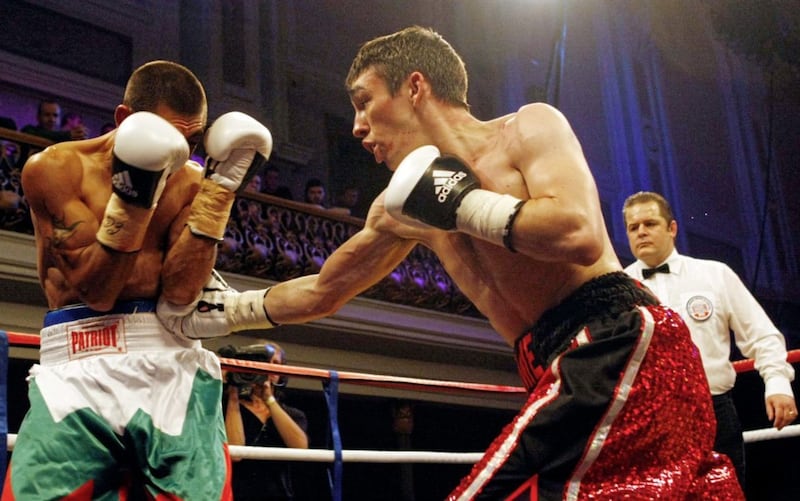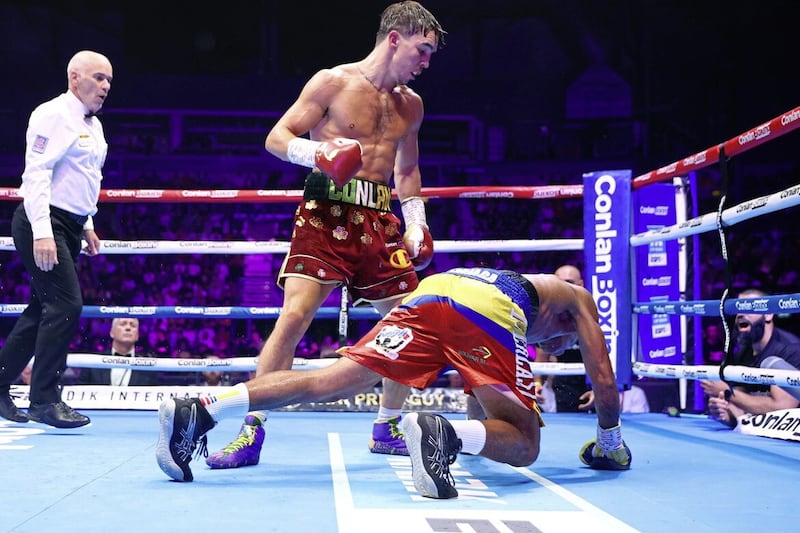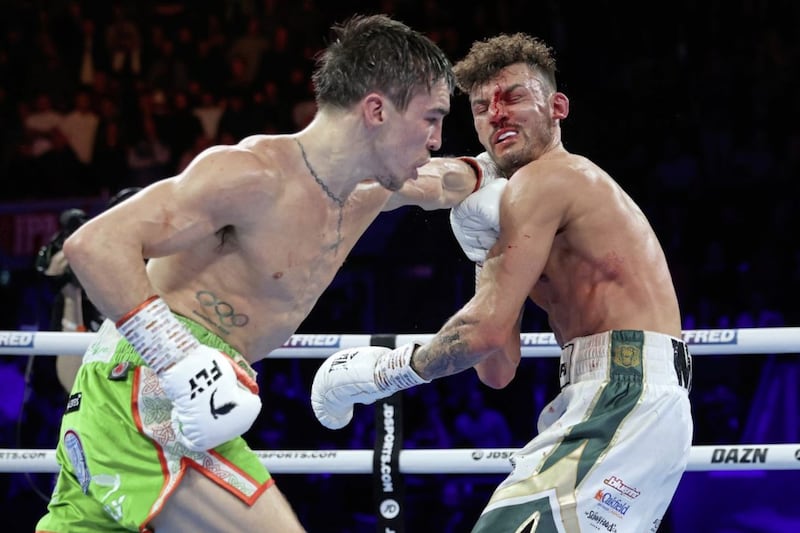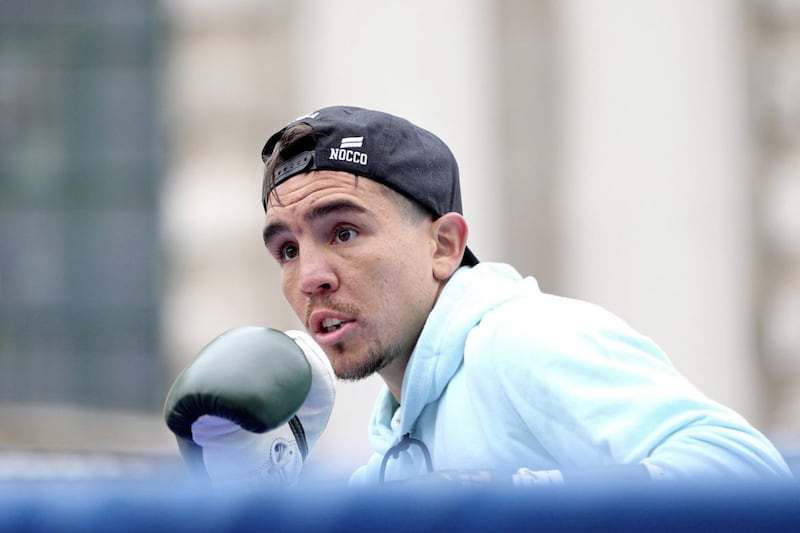TWO sides of the same fighting coin, Jamie and Michael Conlan intend to be the first Irish brothers to win world titles. If they get there, they’ll have taken contrasting routes to their titles.
Jamie, who has had to shrug off bad luck and broken promises to graft his way to the top, gets a long-awaited title shot against IBF super-flyweight champion Jerwin Ancajas at the SSE Arena next month.
Meanwhile, Michael was earmarked as a future superstar even before he became Ireland’s first ever male amateur world champion. As a prized Top Rank prospect, the Los Angeles-based super-bantamweight is being groomed for the very top, but he will leave nothing to chance.
In the first of a two-part interview, the west Belfast fighters discuss past, present and future with Andy Watters….
AW: You started first Jamie, how did you get into boxing?
JC: I was 13. Our Brendan (the eldest of the four brothers) was the one who wanted to go boxing. I played football for Celtic Boys and my da (John, Olympic and Commonwealth Games coach) made me go with Brendan, I didn’t want to go.
Every year my da would buy us a punch ball and boxing gloves and he always wanted us to go boxing. My earliest memory of boxing is getting up one morning and my da looking at Ceefax to see if Wayne McCullough won his world title fight in Japan.
MC: We were never forced into it.
JC: Seanie McCaffrey (St John Bosco ABC coach) lived across the road from us and my da promised that I would get 50 quid if I stayed at it for a full year - not change sport, go three nights a week… Me and Brendan went for a full year.
AW: Did you get the money?
JC: No, we never got it.
AW: So you followed in Jamie and Brendan’s footsteps then Michael?
MC: Once they started boxing I just wanted to do what they were doing. I started when I was about seven.

AW: You boxed for Clonard ABC though?
MC: I was at the Bosco for a few nights and then I was told I had to go because I was too young - Seanie thought if you started too young you’d get sick of it.
It’s one of the most heart-breaking memories of my boxing career. Clonard had just opened so I went and joined them and I loved it straight away, it all just came naturally to me.
But if Jamie had stopped I probably would have stopped too. Even now, I always want to be like my older brothers. I think it’s a natural thing for a younger brother.
Michael Conlan: The wild child
AW: You had to keep an eye on Mick in his younger days Jamie?
JC: When he was 15 or 16 he was messing around with bad crowds and I would have to go and hit him a clip on the ear and bring him home. He was the wild child.
MC: At that age I would have been very secretive of what I was doing. I never would have let anybody know because I was always afraid of letting him down. His look of disgust was like my da’s look of disgust.
He was flying at the time, he was Ulster senior champion and boxing internationally and when I was doing things outside of boxing I felt like I was letting him down.
One of the main reasons I became successful was, no matter what, they were always saying ‘He’s the best brother’. They were always installing confidence in me, even without knowing they were doing it. My ma was always doing it, I know mas always do that, but she was always doing it and it stuck.”
AW: Did you get into any serious trouble?
MC: No, not really. I was just doing things that kids in our area did and they were the wrong things.
AW: What about school?
MC: Jamie was good in school.
JC: I passed all my GCSEs, did my A-levels… Politics, Media Studies and Leisure and Recreation.
AW: Did you have a career in mind?
JC: Not really. I was doing an AS politics exam. When I finished I got up pretending I was going to the toilet. There was a bus outside with the two Hamill brothers and I got on it and we went to Kildare to box against Canada.
AW: Did you pass the exam?
JC: Yes, but boxing always took precedence. School was always very important in our house, our mother is in Belfast MET and at that time she was in university as a mature student.
My da always made sure you had the homework done before you went to training and it was always drummed into us that we had to be educated. Not so much when our Michael came along… He got away with murder because he was the golden child.
'You'll never get a job with that tattoo'
MC: I skipped school to go to boxing. I know I could have done well in school if I had put my mind to it but my mind was always on boxing. I always knew I was going to be a boxer.
I remember when I got the rosary beads tattoo done. I was 17 and my da went buck mad.
He was saying ‘you’re never going to get a job’ because tattoos weren’t like they are now. I was saying: ‘What are you talking about? I’m going to be a boxer anyway’. He was just disgusted.
JC: He was disgusted; I remember walking in that day.
MC: My ma just said to me: ‘It’s lovely’.
JC: I just remember saying: ‘You can’t change it now, it’s done, just leave it’.
MC: I knew it was alright, I knew I was going to be a boxer.
AW: Did anyone ever try to go you out of boxing?
JC: My politics teacher sat me down and said: ‘Boxing will not pay the wages, you have to choose between one or the other’. I said I was always going to choose boxing but I never gave up on the education. Come to think of it, I don’t know why I ever picked politics!
AW: Did you think about going to university?
JC: Yes I did, but as soon as I got my A-levels I went to work in Bombardier and I’m a qualified aircraft engineer. I worked there for four years.
AW: Then you became a full-time pro?
JC: Yes but I realised that being a full-time pro does not pay the bills, especially at the start. I had to work various jobs – I worked as a tiler, I worked as porter in the Royal and in the neo-natal unit cleaning the incubators.
MC: All that builds character.
JC: That was the difference between the start of my career and Mick’s career. He, and rightfully so, doesn’t need to focus on anything else but boxing.
AW: It was a struggle for you at the beginning Jamie?
JC: The word ‘professional’ is very, very loose. Amateur boxing is more enjoyable, it’s a lot more of a sport, pro is a business first and a sport second.
At the start you’re fighting in leisure centres, you’re fighting after the main event when nobody cares and you have to sell tickets to earn your living.
You rely on fight-by-fight wages and you could train for eight weeks with no guarantee of a paycheque at the end and the paycheque isn’t great because no-one gives a hoot about you.
There was Michael, my dad, my other brothers and my fiancé who would have been with me at the start. You have to believe in your ability to get through that stage and move on.
'I don’t take what I have for granted because I know how hard it is'
MC: I remember watching his early fights and I was devastated when the arenas were empty.
I was like ‘where is everybody going?’ I was disgusted; I was like ‘How can you do this to somebody?’
Nowadays when people turn pro they think they’ll be living this fancy lifestyle but it’s not really like that. The two per cent get that kind of treatment and they’re very fortunate. Everybody has to realise that turning professional is a lot of hard work, a lot of lonely days, times with no money.
I saw it with Jamie when I was growing up so I have seen the bad side of the game. I don’t take what I have for granted because I know how hard it is. It’s not glam, it’s actually really, really hard and I would say to anybody turning pro: ‘Make sure you think it through and make sure you have a lot of backing’.
AW: There are major shows in Belfast regularly these days, but it wasn’t like that when you started in 2009 Jamie?
JC: No, you had to rely on a Paul McCloskey fight or Rogie (Martin Rogan). I got lucky one night at the Odyssey fighting before Rogie – that gave me a platform to jump off because Rogie is from the same area as us in west Belfast and the whole of the Lower Falls was there.
AW: You were with John Breen in those days and you had Eamonn Magee in your corner. How good was he?
JC: Magee was brilliant. He’s a great guy to judge a fight and he can spot a weakness within 10 seconds. When he called a combination, most of the time it worked.
I remember we had Sean McGoldrick (Commonwealth Games champion) from Wales over for sparring and Magee called ‘jab, right hand to the body, left hook, right hand to the head’ he just shouted it out and I threw it and your man went down onto the bottom rope. Every shot worked.
AW: Even with Magee and Breen in your corner they were tough times for you?
MC: If MTK hadn’t come along he probably would have been retired by now because he lost the love for boxing. He hated boxing, he hated talking about boxing.
He loved my career and hated his own career and now he’s loving both, he’s loving life.
JC: I remember I trained for six weeks for a British title fight against Paul Edwards that was never on. I was told a week before it that the fight was off and that I was doing a six-rounder on the show.
I went over to Liverpool and I saw Paul Edwards and asked him: ‘What happened?’ He said: ‘I pulled out weeks ago and I wasn’t training’.
They made me weigh-in at 5pm on the night of the fight and told me I was on at 6.30pm but I didn’t fight until one o’clock in the morning after the show was over.
Me and John Breen and my da went over and they gave us a room in the Premier Inn. John tried his best, but no-one really cared about Belfast. Now we have Sky and BT and BoxNation coming over and we have a platform for the lads coming through.
Carl Frampton's influence
AW: What changed it all?
JC: I think it was Carl Frampton, he was a major influence.
AW: Barry McGuigan has to get some credit for that?
JC: What he did at the start of Carl’s career was fantastic. You can say what you want but he was a pundit on Sky Sports and every second sentence – it didn’t matter who was fighting, it could have been an African heavyweight – he brought Carl Frampton into the conversation.
The average armchair viewer would have heard of Carl Frampton and he promoted him brilliantly here at the very start, he brought in the older generation. He was very shrewd.
But other than that it was Carl himself. If he didn’t have the personality he has people wouldn’t have warmed to him the way they have. Carl has made himself the star that he is and has made everybody else a platform to jump on.
AW: Michael’s career has been a contrast to yours Jamie?
JC: Yeah it has, but when I worked in Bombardier I remember telling every Tom, Dick and Harry that I had a brother who was going to be Olympic champion.
I had seen him doing things in training I had never seen done before – I remember singing his praises like mad and then he got beat in his first fight at the Commonwealth Games in India. I was thinking: ‘Ah you dick, you’ve made me look terrible in this place’. It was devastating but that was the catalyst for the drive that he has now.
AW: Losing taught you a valuable lesson Mick?
MC: 100 per cent. The Commonwealth Games showed me not to believe my own hype. In the training camp I was sparring with Paddy (Barnes) and they were great spars. Everybody was telling me I was going to win gold. Then I got beat.
AW: The success of the team – Tommy McCarthy, Steven Ward, Paddy Barnes, Eamonn O’Kane and Paddy Gallagher all won medals – must have made it even harder to take?
MC: We got home and the media and the fans were there and getting pictures with the medal winners. I burst out crying and walked straight out. I was heartbroken.
AW: You find it hard to hold back the tears?
MC: Yes, I’m an emotional person. I find it hard to hide emotion at times.
JC: In a heartbeat he could break down. He’s not emotional in a soppy kind of way but he wears his heart on his sleeve.
MC: Sometimes, if I don’t like someone I find it hard not to show that I don’t like them, stuff like that.








